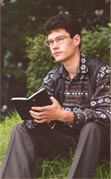
While young Russian people are being manipulated to demonstrate and foment unrest in peaceful Helsinki, there is more fruitful literary communication between young authors writing in Russian and living, variously, in the three Baltic countries, plus Saint Petersburg, the Kaliningrad oblast, and Finland.
There have, in the past, been two Russian-language literary periodicals published in Tallinn, Estonia. I think both are now defunct, but they were, firstly, Raduga, which was an occasional addition, in Russian, to the popular Estonian literary monthly Vikerkaar; and a periodical centred around Russian culture in Estonia, including the exploits of Yuri Lotman and the Moscow-Tartu school of semiotics, called Vyshgorod, the name echoing the Upper Town of Tallinn.
Nowadays, there is an initiative, part print, part internet, called Vozdushny Zmei (implying, perhaps, a dragon-shaped kite, or similar), which is published in the Estonian university city of Tartu. In 2/2006, for instance, an issue I happen to have a copy of, there were poems, prose-poetry and short-stories from Riga (Semën Khanin), Vilnius (Yelena Eltang), Saint Petersburg (Aleksandr Skidan), Helsinki (Polina Kopylova), Tallinn (P.I. Filimonov) and Kaliningrad (Igor' Belov),
One leading poet in these circles is Igor' Kotyukh (Igor Kotjuh, in Estonian transliteration), who publishes in both Russian and Estonian. His Estonian collection, containing some translations of his own poems and some originals, appeared in 2007, under the title Teises keeles (In a/the Second Language).
In the 2/2007 issue of Vozdushny Zmei, several Estonian poets were translated into Russian: Doris Kareva, Mathura, Aare Pilv, Triin Soomets, fs, Jürgen Rooste, Kivisildnik and Elo Viiding. The poems were published in parallel text.
Other Baltic-Russian authors include, for example, Aleksei Purin and Vadim Keilin (Saint Petersburg), Denis Kuzmin, Dmitri Krasnov, Ligia Tenina and Nikita Dubrovin (Tallinn), Doxie and Irina Melyakova (Tartu), Tatyana Pertseva (Helsinki), Natalya Antonova, Pavel Nastin and Irina Maksimova (Kaliningrad), Artur Punte and Erika Drungyte (Vilnius), Sergei Timofeev (Riga). Names to look out for, though the quality of what they write can only be judged internationally, once they have been more widely translated.
And one further author to note: the Finland-Swedish author Zinaïda Lindén is, as you can see from her forename, originally Russian.
I cannot deny that the names of all these Baltic-Russian authors, mostly born between 1960 and 1984, were totally unknown to me before receiving some material, sent to me by Igor Kotjuh. Given the fraught nature of Russian-Baltic relations around the Baltic littoral, it is nice to see the occasional glimmer of hope that Balts and Russian-speakers can cooperate at a literary level.
There have, in the past, been two Russian-language literary periodicals published in Tallinn, Estonia. I think both are now defunct, but they were, firstly, Raduga, which was an occasional addition, in Russian, to the popular Estonian literary monthly Vikerkaar; and a periodical centred around Russian culture in Estonia, including the exploits of Yuri Lotman and the Moscow-Tartu school of semiotics, called Vyshgorod, the name echoing the Upper Town of Tallinn.
Nowadays, there is an initiative, part print, part internet, called Vozdushny Zmei (implying, perhaps, a dragon-shaped kite, or similar), which is published in the Estonian university city of Tartu. In 2/2006, for instance, an issue I happen to have a copy of, there were poems, prose-poetry and short-stories from Riga (Semën Khanin), Vilnius (Yelena Eltang), Saint Petersburg (Aleksandr Skidan), Helsinki (Polina Kopylova), Tallinn (P.I. Filimonov) and Kaliningrad (Igor' Belov),
One leading poet in these circles is Igor' Kotyukh (Igor Kotjuh, in Estonian transliteration), who publishes in both Russian and Estonian. His Estonian collection, containing some translations of his own poems and some originals, appeared in 2007, under the title Teises keeles (In a/the Second Language).
In the 2/2007 issue of Vozdushny Zmei, several Estonian poets were translated into Russian: Doris Kareva, Mathura, Aare Pilv, Triin Soomets, fs, Jürgen Rooste, Kivisildnik and Elo Viiding. The poems were published in parallel text.
Other Baltic-Russian authors include, for example, Aleksei Purin and Vadim Keilin (Saint Petersburg), Denis Kuzmin, Dmitri Krasnov, Ligia Tenina and Nikita Dubrovin (Tallinn), Doxie and Irina Melyakova (Tartu), Tatyana Pertseva (Helsinki), Natalya Antonova, Pavel Nastin and Irina Maksimova (Kaliningrad), Artur Punte and Erika Drungyte (Vilnius), Sergei Timofeev (Riga). Names to look out for, though the quality of what they write can only be judged internationally, once they have been more widely translated.
And one further author to note: the Finland-Swedish author Zinaïda Lindén is, as you can see from her forename, originally Russian.
I cannot deny that the names of all these Baltic-Russian authors, mostly born between 1960 and 1984, were totally unknown to me before receiving some material, sent to me by Igor Kotjuh. Given the fraught nature of Russian-Baltic relations around the Baltic littoral, it is nice to see the occasional glimmer of hope that Balts and Russian-speakers can cooperate at a literary level.
No comments:
Post a Comment